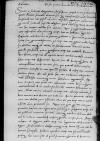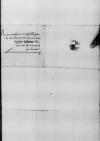Si eam in scribendo diligentiam, Amplissime Praesul, in me probaveris, quam ⌊Plinius Secundus⌋ ab amico suo usque requisivit, has modo litterulas Amplitudo Tua non posset non boni consulere, quod cum nullum argumentum scribendi suppetat, id ipsum quod nihil suppeteret, tantum non hoc tempore coactus sim exarare. Nam si argumenta animi votis responderent, alia plerumque Amplitudo Tua ac uberiora legeret. Praesentes nihilominus eo futuras gratiores in spem venio, quia talem sortitae sint grammatopherum, qui Amplitudini Tuae non gratus modo, verum sic dilectus numquam non exstitit, ut fabulamenta etiamnum omnia, quae ille perferret, quam gratissima Amplitudini Tuae redderet.
Pervenit ⌊huc⌋ fama Amplitudini Tuae derepente tantus morbus incidisse, ut etiam salus Amplitudinis Tuae desperaretur. Rumor sane ille haudquaquam laetus et intempestivus mihi nuntius fuit, qui quantum doloris incussit, quantum contristarit, non opus est prolato et, veluti rem minime dubiam, praetereo. Hoc autem probe scio non mediocrem vitae partem mihi sustulisse omniumque rerum fastidium ingenerasse atque tum temporis non potui non vehementer mirari hominum insignem malevolentiam et in malis perferendis miram velocitatem notare, meas etenim ad aures ea Amplitudinis Tuae adversa valetudo, si bene memini, aut 1538-04-10⌊decima1538-04-10⌋, aut 1538-04-11⌊undecima Aprilis1538-04-11⌋ pervenit, ad aliorum non dubito, quin postridie ab eo die, quo Amplitudo Tua eo morbo affecta fuit, perventum sit. Nunc autem gratias ago Deo meo, qui preculas suorum non aspernatus sed benigne suscipiens Amplitudinem Tuam ad pristinam revocavit sanitatem meumque acerbum dolorem et luctum incredibili vicissim gaudio compensavit.
Accepi insuper serenissimam ⌊regiam maiestatem⌋ Amplitudini Tuae legationem ad ⌊Romanorum regem Ferdinandum⌋ dedisse eamque Amplitudinem Tuam, etsi vix morbo levatus, suscepisse. Factum equidem Amplitudinis Tuae plurimum laudo proboque, hoc enim praeter id, quod summam gloriam et honorem inde referet, Amplitudo Tua praestiterit, ut eum animum, quem ab initio non nisi fidelissimum et infractum serenissima ⌊regia maiestas⌋ cognovit, eundem modo non cognoscat solum, sed penitus etiam perspiciat et ad perpendiculum in his maxime annis et hac tempestate non immutatum, verum (si quid accedere possibile est) quasi fide auctum experiatur.
Ac quod Amplitudo Tua, cum ⌊regiae maiestati⌋, tum ceteris omnibus notum et testatum esse {esse} voluit, nempe Amplitudinem Tuam nihil detractare, quoquo tempore, et quoquo versus, modo id per valetudinem liceret, regiae maiestati honori esse et emolumento, id nunc denique sole meridiano clarum magis et nemini non perspicuum reddetur. Eo vero deventum esse profecto miserum, ut ⌊Prussia⌋ eos dare legatos cogatur, quos ad orbis monarchas ableget ⌊Polonia⌋.
Quod superest, precor, ut Deus Optimus Maximus susceptam legationem super omnia omnibusque ex partibus fortunet, cum eam honeste subterfugere non potuit Amplitudo Tua. Ad proximam, quam scripsi Amplitudini Tuae epistulam huc adveniens, puto praesens respondebit. Quare non est, quod litteras aliquas ab Amplitudine Tua interea exspectem. Christus ⌊Iesus⌋ eandem Amplitudinem Tuam cum sibi carissimis iugiter servet.


